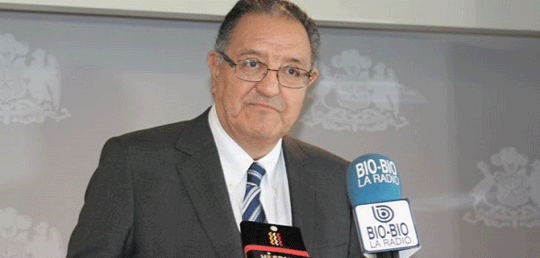



By Charlotte Karrlsson-Willis
Published On : Sat, May 31st, 2014

Governor of the Araucanía Region, Francisco Huenchumilla, got into a war of words about how to improve security in his area. Photo courtesy of Mapuexpress
While the hunger strike of Mapuche spiritual leader Celestino Cordova ended Thursday, politicians continue to be at odds about the best way to bring peace in the ongoing conflict between indigenous Mapuche groups and the Chilean state.
Francisco Huenchumilla — the governor for the Araucanía Region which is home the majority of Mapuche land activism — met with the “machi” last week to discuss his motives for the hunger strike. The Mapuche leader was also visited by Sen. Alejandro Navarro on Thursday but Cordova maintains that he stopped his protest for health reasons not because of any discussions with the politicians. Cordova, who is serving 18 years for the 2013 deaths of the Luchsinger-Mackay couple, began his hunger strike on May 12 following the Supreme Court’s rejection of his appeal. He had been protesting for help for his fellow prisoners who had been on hunger strike for 36 days at the time of his own announcement, care for another mapuche prisoner Jose Llanka Tori who is in need of a liver transplant, and a transfer to a different facility in Vilcún where he would be better able to fulfill his role as a spiritual leader.
“As a result of the fight for our Mapuche nation, our ‘machi,’ our spiritual authority, has been sentenced and it is evident that this is a political conviction on the part of the Chilean state,” read the statement from representatives of Cordova when he first announced his hunger strike. “It is a perfect way of protecting the economic interests of all the usurpers and settlers that are within our Mapuche territory, together with large transnational enterprises further spiritually, culturally and economically impoverishing all our people.”
After 18 days without food and dropping 20 pounds, the mapuche healer ended his hunger strike but pledged to continue his fight for his people. However, the debate over the local government’s treatment of Cordova during his protest and future plans to address the ongoing Mapuche conflict in the area continues through a war of words that started after Huenchumilla’s visit.
A member of the Christian Democrat (DC) party who himself is of indigenous descent, Huenchumilla came under fire from fellow politicians and former ministers for meeting with the prisoner.
Andrés Chadwick, interior minister under the previous administration, called the visit a “grave error” that further victimized the families of those Cordova was found guilty of killing.
“[The visit] was very painful and unjust for the victims of violence … especially for the Luchsinger-Mackay family,” Chadwick told El Mercurio last week. “The attitudes and words of the governor are a grave error … and do not contribute to social peace.”
The issue heated up when the governor replied to this comment by saying he is prepared to take drastic measures to resolve the problems in his region.
“I am able and willing to set myself on fire in the Plaza de Armas in Temuco for social peace if it is necessary,” Huenchumilla said Thursday during a meeting with business leaders in the Auracanía capital.
The governor later clarified his strongly worded statement — which had earned him new criticism from various politicians — saying that he feels supported by President Michelle Bachelet but that there are still some within the Chilean system who do not understand the full situation in his region.
“What I was referring to as the central level that does not understand, I am referring to the Chilean political class as a whole and I do not believe that is is very knowledgeable of the history of Chile in the Araucanía Region,” Huenchumilla said Friday.
Senator for the region and current vice president of the upper house, Eugenio Tuma, said that these grand statements are not what is needed, but rather a legislative bill that the government can work on.
“It is not necessary for the governor to have to light himself on fire in the plaza to get the attention of the central government,” the Party for Democracy (PPD) senator said Friday. “What Huenchumilla should do is bring together the political and social actors in the region with the aim of presenting a draft of a bill that has to do with the reparations to the native peoples and for the Araucanía Region.”
For his part, the governor urged everyone to move the discussion from small issues and incidents to a bigger discussion of the core problems involved.
“I cannot be answering all the criticism that comes from all sides if they do not go to the depth of the issue,” Huenchumilla said.
Source: The Santiago Times